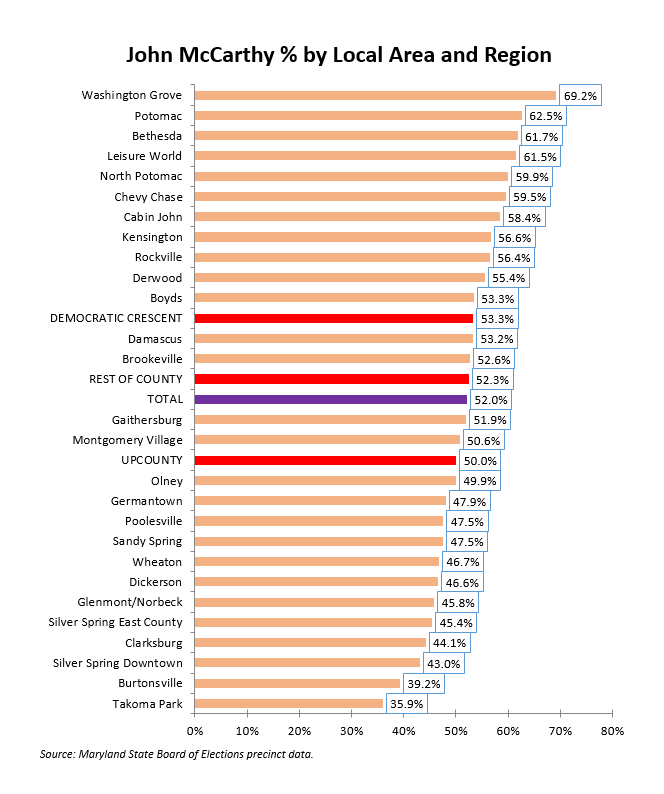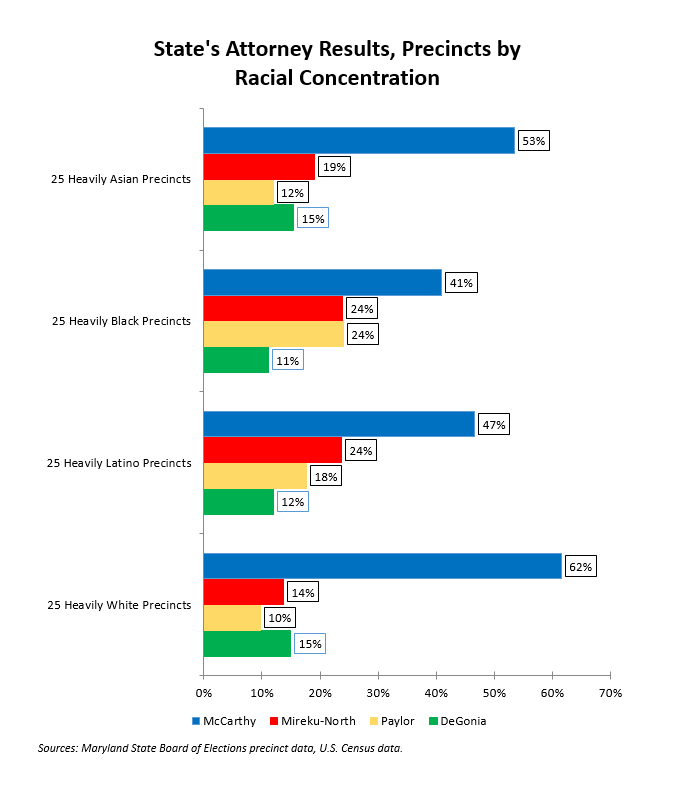By Adam Pagnucco.
We saw it in the Attorney General primary and here it is again in the State’s Attorney primary: MoCo’s patterns of racial voting. The fact that both of these elections apply to top positions in the legal system may not be a coincidence.
First, a note on the incumbent, John McCarthy. After first winning the 2006 Democratic primary with 68% of the vote, McCarthy had no primary opponents in the next three elections and crushed Republican rivals in 2006 and 2014. He was due for a real contest, and with the controversies in the criminal justice system both locally and nationally over the last few years, he was going to get one.
He wound up drawing three quality opponents. Two – Bernice Mireku-North and Tom DeGonia – are former prosecutors and the other – Perry Paylor – is a current prosecutor in Prince George’s County. DeGonia almost ran against McCarthy in 2018 and ran unsuccessfully for delegate in 2006. Mireku-North co-chaired County Executive Marc Elrich’s Reimagining Public Safety Task Force, which issued numerous recommendations last year. McCarthy had to take any of the three seriously, but since all of them ran, that put him in the catbird seat.
The table below shows fundraising in the race. Here was a surprise – Paylor essentially tied the incumbent in fundraising. DeGonia also had enough money to play. Mireku-North’s status as the only female candidate was an advantage in a year that saw many strong performances by women across Montgomery County.

The challengers had a problem: there were too many of them. Another problem was that none of them really took the gloves off against McCarthy. Running successfully against an incumbent requires persuading the voters that the incumbent has committed a firing offense. The closest the challengers came to this was a Washington Post article three days before election day in which they took turns criticizing McCarthy from the left. But none of them truly committed to this approach and both Paylor and DeGonia had enough money to do some damage. Perhaps each of the three was waiting for one of the others to make a big move. No one did and McCarthy cruised to win 52% of the vote, a healthy number against three opponents. He also finished first in 248 of the county’s 256 voting precincts. Of the challengers, Mireku-North received 19% of the vote, Paylor received 15% and DeGonia received 14%.
While none of his opponents came close to unseating him, McCarthy’s performance had significant geographic variations. The chart below shows his percentage of the vote by region and local area.

McCarthy’s best performances tended to be in heavily White, older and/or affluent areas like Bethesda, Chevy Chase, Cabin John, Potomac and Leisure World. His worst performances tended to be in heavily Black and brown communities, although he did win in all of them. In Takoma Park, the most progressive area in the county (and probably in the state), Paylor came within 9 points of McCarthy and Mireku-North was 12 points behind.
The above geography hints at racial voting patterns in the election. The chart below shows percentages for each of the four candidates in the 25 most heavily concentrated precincts among Asian, Black, Latino and White adults. (See my methodology post for definitions.) McCarthy and DeGonia are White and Mireku-North and Paylor are Black.

McCarthy won 62% of the vote in the county’s most heavily White precincts and 53% in the county’s most heavily Asian precincts. But the combined total of Mireku-North and Paylor exceeded him in the heavily Black precincts and came within 5 points of him in the heavily Latino precincts. DeGonia received his highest percentages in the White and Asian precincts and fared worst in the Black precincts, mirroring McCarthy’s pattern.
John McCarthy will now serve his fifth term and will go down as one of the county’s longest-tenured elected officials. But this primary will be remembered as one of the most vivid illustrations of why race still matters in MoCo elections.
